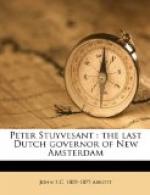Henry Townsend, of Jamaica, ventured to hold prayer-meetings in his house, in defiance of the ordinance against conventicles. The governor sentenced him to pay a fine of eight pounds and to leave the province within six weeks, under pain of corporeal punishment. This sentence was followed by a proclamation, fining any one fifty pounds who should entertain a Quaker for a single night, and confiscating any vessels which should bring a Quaker to the province.
The inhabitants of Flushing, where Townsend had formerly resided, and where he was very highly respected, issued a noble remonstrance to Governor Stuyvesant against this persecution of their former townsman.
The remonstrance was drawn up by the town clerk, Edward Hart, and was signed by all the adult male inhabitants, twenty-nine in number. The memorial said:
“We are commanded by the law of God to do good unto all men. The law of love, peace and liberty, extending in the state to Jews, Turks and Egyptians, forms the glory of Holland. So love, peace and liberty extending to all in Christ Jesus, condemn hatred, war and bondage. We desire not to offend one of Christ’s little ones under whatever form, name or title he may appear, whether Presbyterian, Independent, Baptist or Quaker. On the contrary we desire to do to all as we could wish all to do to us. Should any of those people come in love among us, we cannot lay violent hands upon them. We must give them free ingress and egress into our houses.”
This remonstrance was carried to New Amsterdam by Tobias Feake, and presented to the governor. His indignation was roused. Feake was arrested and committed to prison. The sheriff was sent to Flushing to bring Hart and two of the magistrates, Farrington and Noble, to the presence of the enraged governor. It was a fearful thing to fall into his hands when his wrath was inflamed. They were imprisoned for some time, and were then released upon their humbly imploring the pardon of the governor, expressing their deep regret that they had signed the remonstrance and promising that they would sin in that way, no more. The town itself was punished by the prohibition in future of all town meetings, without the permission of the governor. Indeed the mass of the settlers were no longer to decide upon their local affairs, but a committee of seven persons was to decide all such questions. All who were dissatisfied with these arrangements were ordered to sell their property and leave the town.
It is not necessary to continue the record of this disgraceful persecution. The governor was unrelenting. Whoever ventured to oppose his will felt the weight of his chastising hand.
New Amsterdam consisted of wooden houses clustered together. The danger from fire was very great. The governor imposed a tax of a beaver skin, or its equivalent upon each householder to pay for two hundred and fifty leather fire buckets and hooks and ladders, to be procured in Holland. He also established a “rattle watch” to traverse the streets from nine o’clock in the evening until morning drum-beat.




